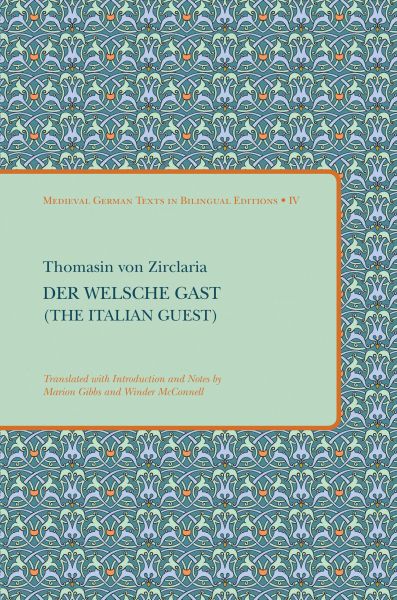Der Welsche Gast (The Italian Guest)
Friedrich Neumann described Thomasin's Der Welsche Gast as a linguistic phenomenon without comparison within the corpus of German literature of the Hohenstaufen period. In the didactic literature of the time, Der Welsche Gast does indeed occupy a unique position ... [It] betrays the heavy hand of the clerical moralist who moves from providing the younger members of his audience with a primer for proper social etiquette in his early verses to a meticulous analysis of what he clearly viewed as the appropriate ethical code for the nobility of his time, often presented against the backdrop of a thundering condemnation of the state of contemporary affairs ... [T]he work remains a remarkable product of an important period in German literature and indeed in medieval European culture; it may be argued with considerable justification that Der Welsche Gast is the most significant didactic work of the German High Middle Ages. Unique in its own time, yet apparently valued by Thomasin's contemporaries and immediately succeeding generations, it belongs very much to its own age, yet, like so much of the literature of the German Middle Ages, it touches chords in the modern reader which cannot and should not be ignored.
Marion Gibbs is Emeritus Reader in German Language and Literature at the University of London, after having taught for many years at Royal Holloway College. She is author of numerous books and articles on medieval German literature. Winder McConnell is professor emeritus of German at the University of California, Davis. He is currently Director of the Teaching Resources Center on the Davis campus.
A Note from the Editor Acknowledgments Introduction Selected Bibliography The Italian Guest Thomasin von Zirclaria's Prose Foreword Preface to Book I Book I Book II Book III Book IV Book V Book VI Book VII Book VIII Book IX Book X Notes
Versandkostenfreie Lieferung! (eBook-Download)
Als Sofort-Download verfügbar
- Artikel-Nr.: SW9781580444996110164
- Artikelnummer SW9781580444996110164
-
Autor
Medieval Institute Publications
- Mit Marion Gibbs, Winder McConnell
- Wasserzeichen ja
- Verlag Medieval Institute Publications
- Seitenzahl 262
- Veröffentlichung 01.07.2009
- ISBN 9781580444996
- Mit Marion Gibbs, Winder McConnell

